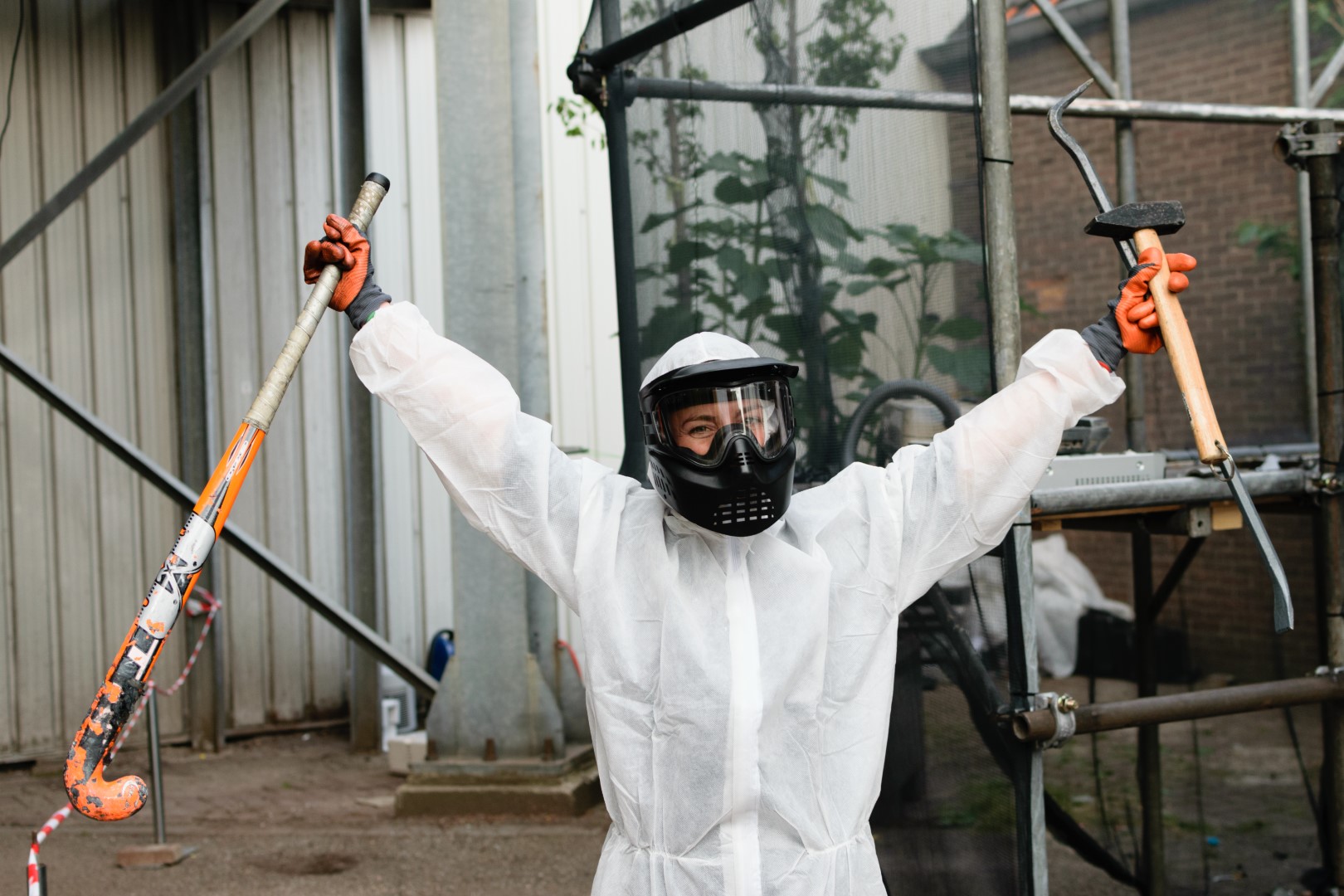[et_pb_section bb_built=”1″][et_pb_row][et_pb_column type=”4_4″][et_pb_text _builder_version=”3.15″]
Control is popular; letting go of it much less so. We seem plagued by the fear that things will get out of hand, that something unexpected will happen.
This has a massive impact on how we think of play.
People like play,it’s as popular as ever, but all too often, we wish for something rather specific to happen when we play. We think we can make a conscious decision that now, play will happen and this and this will result from that.
That way, disappointment and frustration, maybe even madness, lies.
Due to the unpredictable nature of play, we can’t say exactly what will happen when we play, where we end up or “what we get out of it”. Yes, you can design a game, rules, the physical space, you can direct the participants, you can do a lot to make sure play happens in a certain way, but play is always potentially subversive. Play always resists the “ROI regime”. Play doesn’t care about our plans, intentions, systems and goals, well-meaning and elaborate as they may be.
A continuum of play
Let’s think of play as a continuum. On one end, we engage in what looks like play from the outside. Well, it probably is play, we may be laughing and having fun, but it feels shallow, somehow. We’re going through the motions, but we don’t loose track of time, we’re still all too aware of ourselves, of our bodies, of our presence in the room. The magic is absent.
This kind of play (or “play”) is often directed in an attempt to make play happen here and now.
On the other end of the continuum, we let go.
Sometimes, when we’re really good and very lucky, play can create a space safe enough for us to be together without the facades and the pretense, without the concerns about being serious or looking good, where we dare to be open about the stuff that’s difficult and we usually don’t talk about. This is when play becomes personal, when we forget about time and place, we’re just there, in that moment, together, showing who we really are.
When this happens, it’s a bit like magic. Just look at the eyes, the way they shine.
It’s this latter form of play I’m particularly interested in, obviously. That’s where it becomes clear why so many people (myself included) believe that “play is what makes us human” or that in play, we connect with some kind of “human core”. As Schiller famously put it: “man only plays when in the full meaning of the word he is a man, and he is only completely a man when he plays“.
[/et_pb_text][et_pb_image _builder_version=”3.15″ src=”http://www.counterplay.org/wp-content/uploads/2018/12/NS3A1499.jpg” /][et_pb_text _builder_version=”3.15″]
No guarantees
The thing is, we can’t ever guarantee that we’ll get there. In fact, I think it’s a fairly rare occurrence for most of us.
We’ll probably never be able to fully understand it, it’s a complex web of things that can influence whether or not it happens. All the people in the room, their energy levels, their feeling of safety, their sincerity, whether or not they’re hungry, the room itself, the smells, noises, temperature – and so on.
Play is indeed like a wicked problem; “A wicked problem is a problem that is difficult or impossible to solve because of incomplete, contradictory, and changing requirements that are often difficult to recognize“.
As my friend Zack said when we talked about this the other day, maybe that’s part of the fun? Maybe the real, deep play is all the more rewarding because it’s not easy to get there, to make it happen & we don’t experience it all that often. I think he’s right on the money there.
What can we do about it?
Nothing.
We’ll just have to embrace the fact that maybe nothing will happen. Maybe we’ll spend lots of time and energy, and we’ll never leave the surface of play.
What we can do, though, is to make an effort, we can practice our capacity to play. Be patient and sincere. Help people feel safe, give them time and space to open up. Make it voluntary. Invite many different forms of play. Talk about what might be hard or intimidating. Pay attention.
Play as love
I’ve said on numerous occasions that we should think of play more like love. Not just in the sense that we love to play (which we do, and deeply so), but that play is similar to love on a more fundamental level. Love takes time and effort, it demands sincerity, openness, presence, and trust. There are no shortcuts to love, no way to bypass the long, slow process of getting close to another person. You can’t hurry love, right? Even after all that effort, there’s no guarantee you’ll feel it – or that the other will. It’s generally a bad idea to look for love with a very specific outcome in mind.
The same is true for play.
Maybe, somewhere down the line, we can manage to turn this issue on its head, taking some of the pressure off, showing people that not getting deep into play is not a failure, but an inevitable part of the game, so to speak. Sometimes magic happens, sometimes it doesn’t. The more we try to force play, the worse are our chances.
We can take the first step together if we simply accept that we can’t control everything, especially, play, and that’s ok.
I realise that in doing so, we would also challenge the entire neoliberal paradigm, but I guess I’m ok with that.
[/et_pb_text][/et_pb_column][/et_pb_row][/et_pb_section]

Leave a Reply